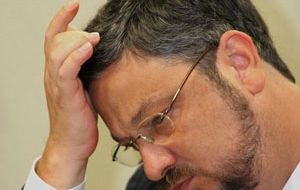MercoPress. South Atlantic News Agency
Embattled Palocci, the most influential official in Brazil’s cabinet, resigns
 The darling kid of Wall Street and foreign investors as in 2006 has stepped down
The darling kid of Wall Street and foreign investors as in 2006 has stepped down Brazil’s embattled Chief of Staff Antonio Palocci described by fellow ministers as the most influential official in President Dilma Rousseff's government resigned on Tuesday to prevent a scandal over his finances from becoming an ongoing distraction for the administration.
Palocci's departure deprives Rousseff of an articulate political negotiator and a strong reference for investors in Brazil based on his stern defence of responsible fiscal and monetary policies in a party with strong roots in trade unionism.
Palocci's work as Finance minister in the first government of former president Lula da Silva (2003/2006) helped build his reputation and together with the Central bank governor Henrique Meirelles adopted the most orthodox approach to inflation, balanced budget and monetary policy.
His departure is not likely to result in any immediate policy shifts, as Rousseff and other senior officials have repeatedly voiced their commitment to keeping inflation low and budget spending under control.
The pillars of Brazil's economic stability have remained largely unchanged for over a decade when the Real reform implemented in the mid nineties by former president Fernando Henrique Cardoso.
However Palocci's absence over time could very well empower other officials in Rousseff's government who are pushing for greater government intervention in key industries such as oil and manufacturing.
Palocci had lost support in Congress following allegations that he had used his political influence to expand his net worth by a factor of 20 since 2005, particularly in the last year as the coordinator of candidate Rousseff’s presidential campaign.
No criminal charges have been filed against him and the chief public prosecutor shelved a formal investigation on Monday. But opposition leaders and even some ruling party allies pressed for Palocci to step aside. Some of them alleged he had made millions by influencing government decisions on behalf of clients of his economic consultancy.
Palocci denied any wrongdoing. But the scandal threatened to dominate the government's agenda, distracting it from making needed reforms in the tax regime and elsewhere.
This marked the second time Palocci has resigned under a cloud. His tenure as finance minister ended in May 2006 amid a separate ethics scandal. The political career of one of the Workers' Party's brightest young stars may now be definitively over.
“There's a bit of a vacuum surrounding economic policy-making now. Palocci was a key player,” said Alexandre Barros, a political consultant.




Top Comments
Disclaimer & comment rules-

Read all commentsMensalao millions & overnight millionaire.
Jun 08th, 2011 - 08:40 pm 0Still, Mandelson came back, and back again.
Commenting for this story is now closed.
If you have a Facebook account, become a fan and comment on our Facebook Page!